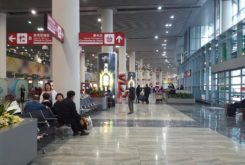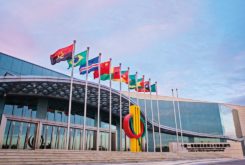With Macau nearing the 20th anniversary of the establishment of the Macau Special Administrative Region (MSAR) at the end of this year – 20 years after Macau’s administration was returned by Portugal to China – there is a growing number of voices who have been calling for changes in the government structure at high level
The ambitious Greater Bay Area (GBA) plan, unveiled by the central government in February 2019 sets out guidelines and establishes a clear role for Macau’s future, but Macau will have to boost its administrative capacity to be able to cope with these directives.
Over the past 20 years, the city has made giant leaps on all fronts. The territory’s area grew by 29%; GDP shot up by 748%; the population increased by 52%, casino revenue leaped by 2,156%, real estate increased by 463% and government revenue grew by 461%. Despite this boom, the government structure has remained very similar to the one before the handover in 1999.
Some new services and offices have been set up such as in the sector of infrastructure development, but even then, this has not been enough to keep up with the city’s rapid development. Both Secretaries Raimundo do Rosário and Alexis Tam Chon Veng have noted they do not have enough staff for the number of requests and challenges they are faced with.
Legal experts and legislators believe that the appointment of a new chief executive on December 20, 2019 could be the opportunity to increase the number of Secretaries.
Article 62 of the Basic Law of Macau does not restrict the number of policy secretaries, and legislators interviewed by CLBrief argue that if Macau wants to follow through on the directives set out in the GBA plan, the number of Secretaries must be increased.
Beijing officials who visit Macau systematically insist that the city should not miss the “development and modernisation train” of the Pearl River Delta region. The re-structuring of the government, at its highest level, could be seen as a major step forward.
Community leaders suggested to increase the number of policy Secretaries from 5 to 7.
Today, the Secretariats of Security and Administration and Justice have a structure that works well. Not only will the next Secretary of Economy and Finance have to prepare for the renewal of gaming concessions in 2022 but he or she will also be responsible for developing Macau’s role as a financial platform for relations between China and the Portuguese-speaking countries.
The Secretary for Transport and Public Works will soon face a number of new land reclamation development projects; a complex public transport network; subsidised home-ownership and social housing projects; public tenders for the construction of the fourth bridge between the Macau peninsula and Taipa; a tunnel linking the peninsula and Taipa; the management of the Taipa Light Rapid Transit (LRT) and the feasibility study of the LRT route on the Macao peninsula.
The Secretary for Social Affairs and Culture will have to create conditions for Macau to become a world tourism and leisure centre by creating new health facilities in Macao, namely the new Cotai hospital in the Islands the construction of which is delayed.
The Hong Kong government has 16 policy Secretaries. This structure was created by the British colonial administration; and today, it is able to operate at a fairly optimal level because there has been no major social and economic changes in Hong Kong.
Macao, on the other hand, has seen drastic socio-economic changes that demand change in government and society to stay afloat.
In a few months, Macau will have a new chief executive. The chief executive (CE) is elected by 400 members chosen by associations or organisations representing various sectors of Macau. There are no direct elections for the position of chief executive.
The associations represent the four sectors covered by the law for their perceived importance to Macau society: the industrial, commercial and financial sector, represented by 120 members; the cultural, educational, professional and other sectors, represented by 115 members; the labour sector, social services, religion and others, represented by 115 members; and the representatives of the members of the Legislative Assembly of Macau, local deputies to the National People’s Congress(NPC) and representatives of the local members in the National Committee of the Chinese People’s Political Consultative Conference (CPPCC), represented by 50 members.
In 2014, there were 825 associations with electoral capacity registered to participate in the election of the members of this electoral commission. Most of these associations or representative organisations are pro-establishment.
So far, two Macau politicians are widely understood to have entered the chief executive race. In February, both Ho Iat Seng and Leong Vai Tac faced questions from journalists about whether they would consider running for CE. Both indicated they were considering a bid for Macau’s top job.
Ho Iat Seng said he was “actively considering running in the chief executive election while Leong Vai Tac stated that he ”needs to listen to opinions raised in civil society, and to comprehensively consider the possibility.”
Ho Iat Seng, aged 61, is a businessman, a former researcher from Zhejiang University, president of the Macao Legislative Assembly, legislator since 2004, member of the Standing Committee of the National People’s Congress of China (NPCSC) and the most senior members of the Macao delegation to the National People’s Congress (NPC) of China, vice-president of he powerful Macao Chamber of Commerce and president of the Industrial Association. Ho Iat Seng is Macau’s only member of the influential NPC Standing Committee.
Known for his family ties with mainland China , Ho is the CEO of the Ho Tin S.A.R.L. Industrial Society, one of the oldest companies in Macau.
Leong Vai Tac, aged 56, is an entrepreneur. He studied at the University of Waterloo in Canada, where he graduated in Mathematics. He is a leading member of the Macao Industrial, Commercial and Importers and Exporters Association, and a former member of the National People’s Congress in Beijing.
Prior to assuming his duties as secretary for Economy and Finance in 2014, Lionel Leong was CEO of the industrial laundry company Smartable Holdings Limited.
Leong’s family was reportedly linked to the New Democracy Movement of Macau in the 1940-50s, which was the precursor of the founding of the Macau Daily News newspaper (Ou Mun Yat Pou).
The chief executive election will be held in August, according to the director of the State Council’s Hong Kong and Macao Affairs Office, Zhang Xiaoming.
The potential candidates for the position of CE will be made clear after June. Even though both Ho and Leong seem to be trusted by China as patriots and are capable of governing Macao, they have very different styles and attitudes.
At the end of the day, Beijing will be the decision-maker as to who is Macau’s next Chief Executive. (CLBrief)



